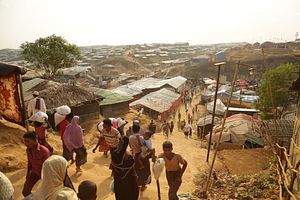On the first floor of an unassuming building on the outskirts of Kuala Lumpur, three wall clocks are set to the times of Malaysia, Saudi Arabia and Arakan, the former name for Rakhine state in west Myanmar.
It’s the hub of Rohingya Vision, a TV channel run by exiled Rohingya. Since 2012, the station has focused on the ongoing crisis in the Muslim minority’s Rakhine homelands. But in recent years the founders have increasingly turned their attention to the swelling ranks of Rohingya refugees. The newsroom now doubles as a base for a mission to unite and uplift the scattered diaspora.
Muhammad Noor, a Rohingya community leader who lives in Malaysia, is the driving forced behind the Rohingya Project. He explains that the goal is to find a solution for one of the biggest problems facing Rohingya refugees in their host countries — financial exclusion due to the absence of an officially-recognized identity.
“We want to produce a digital identity using blockchain that is incorruptible, far from centralization, and where nobody has the kill switch,” says Noor.
He is referring to the decades of persecution faced by the Muslim minority under successive governments in Buddhist-majority Myanmar, which has denied the Rohingya’s long history in the country and in 1982 stripped them of their rights to citizenship, effectively rendering them stateless.
Noor’s team is using blockchain technology — that stores information across a network of computers rather than a central authority such as a government — to create digital identities for Rohingya, starting with the sizeable diaspora in Malaysia, Bangladesh and Saudi Arabia.
The aim is to empower refugees, who are mostly forced to work in the shadow economy, with an identity that then helps them access services such as banking, education and healthcare.
A Blockchain Revolution?
In the last few years a growing number of projects have turned to blockchain to tackle humanitarian challenges. From global corporations such as Microsoft and Accenture to start-ups including BanQu and Tykn, multiple groups are entering the digital identity space.
The blockchain buzz has raised valid concerns in some quarters, particularly surrounding the security implications for an already vulnerable group. Emre Eren Korkmaz, a lecturer in migration and development at the University of Oxford, warned of the risk of abuse in a blog last year. “An authoritarian state could use such data collected from refugees against refugees,” he cautioned.
It’s one of the reasons why the Rohingya Project, launched in late 2017, is treading carefully. A planned pilot for 1,000 Rohingya to test the first wave of digital identity cards has been pushed back to the end of this year. “Digital identity and blockchain is evolving so fast. We need to comply with all the security and privacy requirements. We want to make sure the data is safe so there is no security breach,” Noor said.
The project is incorporating recommendations from a 2018 feasibility study conducted by a research team at the University of Washington, and in January it was chosen to join an accelerator scheme for NGOs working on digital identities. This month the team pilots in Malaysia its latest idea – “R-Tokens,” to reward Rohingya who volunteer with local charities. The crypto-tokens are then redeemable for items such as laptops. “It uses blockchain but isn’t a crypto-currency,” stresses Noor, as for now the tokens can’t be exchanged for cash.
Nation-Building
There are an estimated 3.5 million Rohingya spread worldwide. The number of those still in Myanmar is today vastly outnumbered by the diaspora. A 2017 military crackdown that UN investigators said was executed with “genocidal intent” saw more than 700,000 Rohingya flee Rakhine for neighboring Bangladesh, the fastest refugee outflow since the Rwandan genocide.
But the Rohingya had started escaping systemic discrimination decades earlier. Noor was born and raised in Saudi Arabia after his family fled Rakhine during the 1970s. The sectarian violence that erupted in the state in 2012 also led tens of thousands of Rohingya to flee, many risking treacherous journeys by sea in search of refuge in countries such as Malaysia.
Noor has faced his own struggles but recognizes he is one of the more fortunate ones in his community. He traveled to Malaysia in the early 2000s to study computer science, a privilege that has driven his activism. Before co-founding RVision and the Rohingya Project, he was part of a move to digitize the Rohingya language. And in 2015 he founded the Rohingya Football Club in Kuala Lumpur. Last June, in a major milestone, Hanifi Rohingya was incorporated into Unicode, the international standard for encoding characters and symbols on computers.
For the 36-year-old, each project is a step toward a much bigger enterprise. “They (Rohingya) feel inferior all the time. Because of the way they’ve been treated. I want to give our community back their pride,” says Noor. “The vision is to make them back into a nation.”
Correction: An earlier version of this article incorrectly stated that the Rohingya language had “no written script until the 1980s”. Some sources (see example here) have in fact noted that while Hanifi Rohingya was developed later in the 1980s, there were other scripts used for writing the Rohingya language including Burmese, Arabic, and the Latin-based ‘Rohingylish’.

































